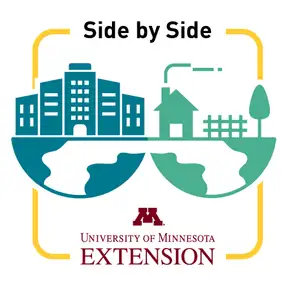Welcome to Side by Side, a new University of Minnesota Extension podcast exploring the connections between rural and urban spaces
Oh, we ain't got a barrel of money. Maybe we're ragged and funny, but we'll travel along singing a song side by side.
Ellen Wolter:Are you a city person that knows nothing about living in a rural community? Or maybe you grow up rural and now live urban. What does rural and urban even mean anyway? How are these spaces connected and why should we care?
Heidi Heitkamp:You know, it's really easy to demonize a whole group of people when you don't have to spend time with them.
Ellen Wolter:Hi. I'm Ellen Wolter. I work at the University of Minnesota Extension, where I work with rural, suburban, and urban communities to navigate civic challenges. My work takes me across the state of Minnesota where I see many of the differences that make up the divide. But more importantly, I see the similarities and the connections across rural urban and suburban spaces.
Ellen Wolter:What do you think we get wrong about rural spaces? What do you think some of the misconceptions are?
Brigid Tuck:Okay. We're lazy. We're boring. We don't do anything fun. We all go to bed at 9 o'clock apparently out here.
Brigid Tuck:The tumbleweed is blowing through town and none of those things are true.
Ellen Wolter:The rural urban conversation is too often rooted in stereotypes, contempt, and rival narratives. Rural and urban fates are shared, but we focus on rural and urban spaces as separate and distinct places.
Rhymefest:I spent a year on a ranch in Wyoming, and what what surprised me is that a lot of things that are in the media as the political talking points that make people take sides aren't even the reality on the ground.
Ellen Wolter:This podcast will give you an alternative to how the rural and urban narrative is usually told.
RT Ryback:The life I live with neighbors and knowing each other's kids and all of these things that people talk about the quote, unquote small town experience, most people in Minneapolis have that experience.
Ellen Wolter:Each episode, you'll hear from experts, community leaders, researchers, and everyday folks about how and why rural and urban communities are connected.
Tony Pipa:Our food systems are primarily rural, and so all the food that gets eaten in cities is coming generally from rural places.
RT Ryback:There are a lot of people who cheer against Minneapolis who happen to be deeply economically tied to it.
Ellen Wolter:How can we be each other's allies? How can we better understand each other?
Heidi Heitkamp:Once we see each other, once we listen to each other, once we're exposed to life stories, the barriers go down.
Ellen Wolter:Join me, Ellen Wolter, as I explore the deep connections across rural and urban spaces, and why this complex and necessary relationship matters.
Singer with Music (Jim Griswold):When they've all had their quarrels and parted, we'll be the same as we started just to travel along singing a song side by side.
Ellen Wolter:This is the Side by Side podcast from the University of Minnesota Extension. Listen wherever you get your podcasts.

